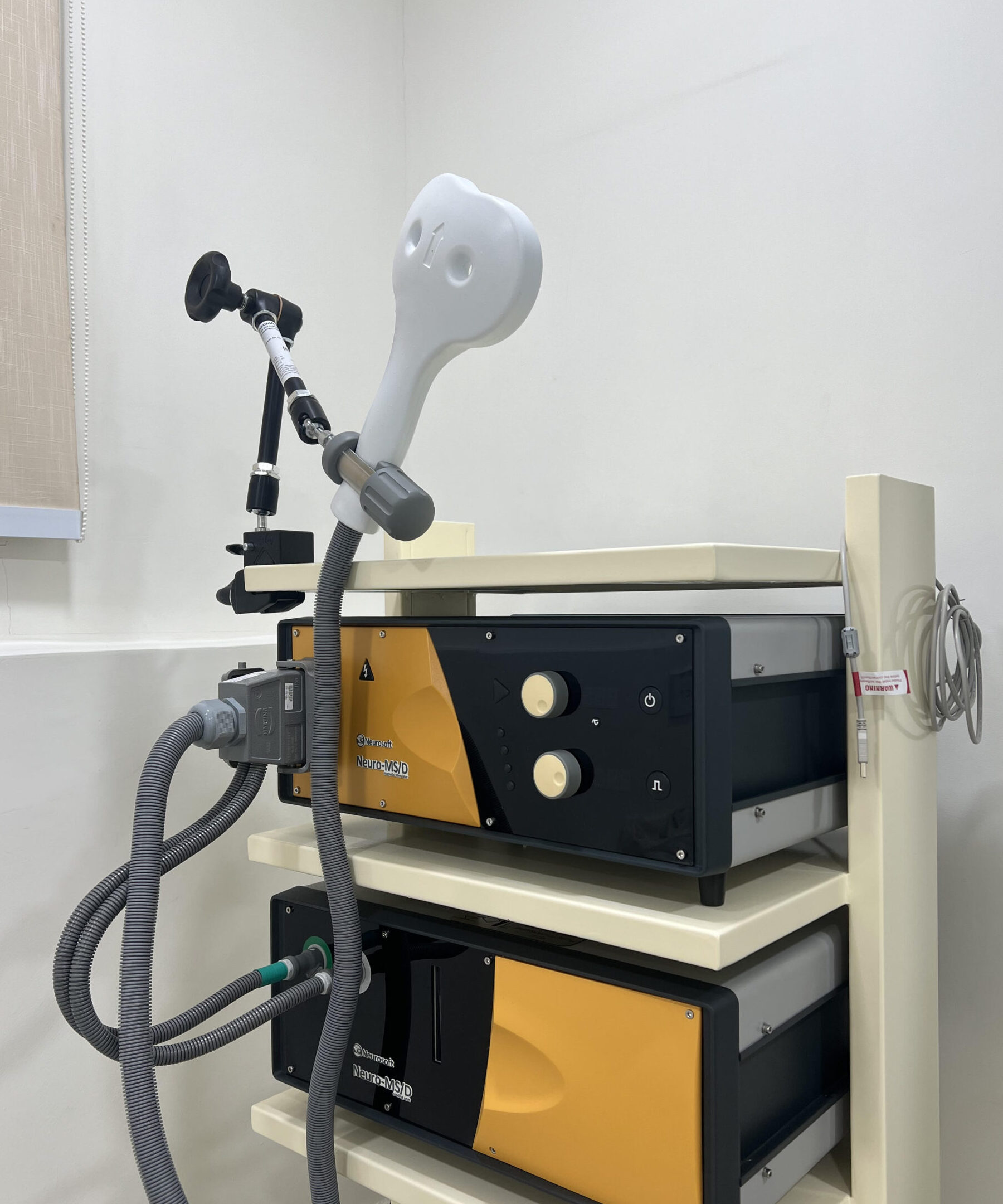Psychiatric Services Backed by Research, Trusted by Thousands

Our Unique Approach to Personalised Psychiatric Consultation and Care

100% Personalised Treament
Your treatment isn't one-size-fits-all. We create a 100% personalised treatment plan that's designed to your unique symptoms and goals.

Integrated Care Model
We combine psychaitry, psychology and assessments into a single seamless system. Our team ensures that your medication, therapy, and assessments align perfectly, so you receive holistic, coordinated support throughout your recovery.

Strong Focus on Assessments
We use advanced psychometric tools and clinical interviews to understand your condition in depth before recommending treatment. This data‑driven approach helps us get the diagnosis right the first time and personalise care that genuinely works.

Advanced Brain Stimulation
For conditions that require more than medication or therapy, we offer cutting‑edge neurostimulation treatments such as rTMS and tDCS. These safe, non‑invasive, FDA approved methods target certain areas of the brain, helping you achieve faster, longer‑lasting improvement.
Consult Our Psychiatrists with 40+ Years of Combined Clinical Experience

Dr Akul Gupta
Consultant Psychiatrist
Therapy Mode Online, in-person
Languages Hindi, English

Dr Siddharth Sethi
Consultant Psychiatrist
Therapy Mode Online, in-person
Languages English, Hindi, Marathi

Dr Sunil Mittal
Senior Consultant Psychiatrist
Therapy Mode Online, in-person
Languages Hindi, English
Compassionate Psychiatric Treatments and Services from Trusted Experts
Psychiatrists at BetterPlace are highly trained mental health professionals who have provided successful psychiatric treatment for over 50,000 patients with a range of mental health conditions, such as:
- Agoraphobia
- Alcohol use disorder
- Alzheimer’s disease
- Anorexia
- Anxiety and panic attacks
- Anxiety disorders
- Arachnophobia
- ADHD
- Autism spectrum disorder
- Binge Eating
- Bipolar disorder
- Body dysmorphic disorder
- Bulimia nervosa
- Claustrophobia
- Depression
- Dissociative disorders
- Gambling disorder
- Gender dysphoria
- Hoarding disorder
- Insomnia
- Mood disorders
- OCD
- Panic disorder
- Personality disorders
- PTSD
- Postpartum depression
- Schizoaffective disorder
- Schizophrenia
- Social Anxiety Disorder
- Sleep disorders
Visiting BetterPlace for Psychiatric Treatment? Here’s What to Expect
A welcoming environment with 0% judgment and 100% confidentiality.

Detailed Initial Session (90 min)
Meet with both a psychologist and a psychiatrist
Comprehensive Testing
Get an accurate understanding of your mental health
Treatment Phase (3-8 Weeks)
Get a personalised treatment plan
Long-Term Support
Get ongoing care with regular follow-ups
Transformation Stories at BetterPlace!
“My brother has had depression for over 4 years without any results. At BetterPlace I found out about rTMS which can help if other treatments don’t work and that has been like a miracle. Obviously i was scared initially because there was a machine but it literally was so gentle and relaxing. Dr Akul has made my brother feel like himself again and he’s finally active and lively nowadays.”
“I used to think feeling anxious was normal. I didnt even know it was anxiety. I’d ask my family about it, they would just say “Aapka jee ghabra raha hai”. But that made less and less sense to me as i started feeling it more and more. I went to BP and i had so many “aha moments”. Everything made sense. Now i am feeling much better but i believe this is much long way to go.”
“You don’t really expect to have panic attacks when you’re over fifty. So when I had my first one at 54, I thought it was a heart attack or something. Obviously I was relieved when I found out it was a panic attack, but thanks to BetterPlace, I was also able to understand what caused them and treat them before it got worse.”
“BetterPlace has helped me manage my OCD so that I can lead a normal life again. Before I would check the lock 23 times before leaving the house and adjust the car mirror 18 times before driving each time. Thanks to my sessions with Dr Akul I have finally broken free of that horrible chain. I feel so free I just cannot express it in words!”
“I lived like a raja in my 20s (parties, drinks etc etc) but I never never never expected it to affect me so much in my 30s. By 34 I was barely getting 3 hrs of sleep each day even tho I desperately wanted to sleep more. Last year it got so bad I went 3 days without sleep. That’s when my friend said come to a better place. Dr Akul is my angel. She has got me a second life.”
“I faced a lot on the battlefield but never thought the real battle would begin once I got home. The nightmares, panic attacks and flashbacks ambushed me when I least expected it. Full credit goes to the excellent doctors at Better Place for helping me tackle my demons head-on. It’s been a slow and steady process but the results have been very encouraging so far.”
Meet Our Psychiatrists for Effective Treatment Today
Visit us or book an online consultation
BetterPlace, East of Kailash
At National Heart InstituteFirst Floor, Annexe Building D Block, East of Kailash, New Delhi
BetterPlace, Gurugram
At Neelkanth HospitalGround floor, 1 Main Mehrauli-Gurgaon Road
DLF Phase 3, Gurugram
Psychiatric Services & Treatments at BetterPlace
What is Psychiatry?
Psychiatry is a branch of medicine focused on the evaluation, diagnosis, and treatment of mental and behavioural health disorders. Psychiatrists are licensed medical professionals who create personalised psychiatric treatment plans and can prescribe medication, provide therapy, and recommend behavioural interventions.
What Does a Psychiatrist Do?
A psychiatrist is a licensed professional who evaluates, diagnoses, and treats Mental Health and behavioural disorders.
Psychiatrists address problems by focusing on all three aspects of well-being: biology, sociology,and psychopathology.
Before creating a personalised psychiatric treatment plan, our psychiatrists study your:
- Genetic predispositions
- Symptoms and complaints
- Neurochemical imbalances
- Pre-existing conditions and comorbidities
- Physical health conditions
- Lifestyle factors such as diet, sleep, and exercise
What are the Types of Psychiatric Treatments?
Medications
Our psychiatrists prescribe medications (if required) such as mood stabilisers, stimulants, neuroleptics, and anxiolytics based on your unique needs and neurochemical profile. These medications support psychiatric treatments by regulating brain chemistry and addressing any chemical imbalances in your body.
Neuromodulation Techniques
At BetterPlace, we use these neuroscientific interventions as a part of our integrated approach to mental health, ensuring you receive the most appropriate and effective psychiatric treatment and services personalised to your unique condition and circumstances.
Electroconvulsive Therapy (ECT): ECT provides relief to people suffering from severe cases of depression and other psychiatric disorders when standard treatments have not been effective. This technique provides rapid relief through controlled and therapeutically induced seizures.
Repetitive Transcranial Magnetic Stimulation (rTMS): rTMS is a safe, non-invasive brain stimulation technique that uses magnetic fields to stimulate specific areas of the brain.
At BetterPlace, our state-of-the-art rTMS machine is integrated into our psychiatric treatment approach, providing non-invasive treatment for depressive disorders, anxiety disorders, OCD (Obsessive Compulsive Disorder), substance use disorders, and Treatment-Resistant Depression (TRD).
Transcranial Direct Current Stimulation (tDCS): tDCS is a non-invasive brain stimulation technique that modulates neuronal activity and treats conditions like depression, anxiety, and cognitive impairments. It involves delivering low electrical current to specific areas of the brain to stimulate and activate brain cells.
Neurofeedback: Neurofeedback is a brain training technique that helps you biologically change how you think and feel. By using specialised equipment, we can modulate and monitor your brain’s reaction to various stimuli in real-time and develop healthier patterns of brain activity. This technique is a part of our comprehensive psychiatric services and is useful for the treatment of disorders such as Attention-Deficit Hyperactivity Disorder (ADHD) and anxiety.
Psychological Interventions
We understand that mental health is deeply connected to thought patterns and emotional processes. Recognising this connection, we use the therapeutic potential of psychotherapy to modify brain function, alter neural connections, and enhance brain plasticity.
We offer a wide range of comprehensive psychological interventions that are central to our treatment philosophy. Our therapists work with you closely to explore and address underlying psychological issues, foster resilience, and promote long-term emotional health.
Cognitive Behavioural Therapy (CBT): CBT is a form of psychotherapy that psychiatrists and psychologists at BetterPlace commonly use for people suffering from depression, anxiety, bipolar disorder, borderline personality disorder, PTSD (Post Traumatic Stress Disorder), phobias, various addictions, eating disorders, insomnia, etc. This technique restructures your current thinking patterns by challenging your thought processes and equips you with problem-solving skills to cope with difficult situations.
Interpersonal Therapy (IPT): IPT is a talk therapy that psychiatrists and psychologists at BetterPlace use for people suffering from eating disorders, social phobia, anxiety disorders, and PTSD. This therapy focuses on a person’s interpersonal relationships by fostering effective communication and understanding relationship patterns.
Mindfulness-Based Cognitive Therapy (MBCT): It is a modified version of CBT that psychiatrists and psychologists at BetterPlace use for treating Treatment-Resistant Depression (TRD), anxiety disorders, substance abuse, PTSD, etc. It incorporates mindfulness techniques such as present moment awareness, meditation, muscle relaxation, breathing exercises, and more as a means to ground you and help you be in tune with your surroundings.
Acceptance and Commitment Therapy (ACT): It is a form of psychotherapy that psychiatrists and psychologists at BetterPlace use for people suffering from Generalised Anxiety Disorder (GAD), chronic depression, chronic pain, substance abuse, and some other conditions. This therapy helps you accept your thoughts, feelings and emotions, and commit to actions that align with your long-term goals.
Dialectical Behavioural Therapy (DBT): Psychiatrists and psychologists at BetterPlace leverage DBT in the treatment of Borderline Personality Disorder (BPD), eating disorders, and substance use disorders. It teaches you how to live in the moment and find healthy ways to cope with stress and other problems in life.
Solution-Focused Brief Therapy (SFBT), Problem-Solving Therapy (PST): SFBT is a goal-oriented, constructive psychotherapy that psychiatrists and psychologists at BetterPlace use for treating conditions such as addiction, child behavioural problems, and relationship problems. SFBT helps you construct solutions to their problems by asking relevant questions, rather than focusing on the problem itself.
Psychodynamic Therapy: Psychiatrists and psychologists at BetterPlace use psychodynamic therapy to treat anxiety disorders, depression, eating disorders, personality disorders, PTSD, etc., especially for people who have lost meaning in their lives. Psychodynamic therapy uses techniques such as free association, dream analysis, and the Rorschach inkblot test to uncover your unconscious desires and past experiences that manifest as behavioural issues in the present.
Social Interventions: Social interventions in psychiatry aim to improve your social functioning and overall quality of life. An individual’s environment, relationships, and societal context can significantly impact their mental health. Psychiatrists and psychologists at BetterPlace adopt a comprehensive view of mental health by incorporating social interventions into our treatment plans.
Psychoeducation:
Knowledge is power. Knowing about your condition gives you a more holistic view of your options and treatment strategies. Our psychiatrists and psychologists educate you and your family about mental health conditions, treatment options, and coping strategies, thus empowering you to make more informed decisions.
Family Therapy: If needed, we involve family members in the treatment process and the therapeutic journey to improve interpersonal communication, resolve conflicts, and support your recovery.
Social Skills Training:
We teach you how to interact with others more effectively, manage social situations, and improve your relationships.
Vocational Rehabilitation:
Our psychologists will help you find and maintain employment so that you can lead a normal life, regardless of how severe your mental health condition is.
Community Support Programs:
We provide access to social services, support groups, and community resources to help you reintegrate into society and maintain your mental health.
We integrate biological, psychological, and social dimensions into our psychiatric treatment to deliver the most effective, compassionate, and holistic care. This biopsychosocial model of care ensures that psychiatrists and psychologists at BetterPlace treat each person as a whole and not just their symptoms. We also address social determinants of health, such as stress and socioeconomic factors, which may contribute to or exacerbate mental health issues.
What is the Difference Between a Psychiatrist and a Psychologist?
Psychiatrists and psychologists both address mental health issues. Psychiatrists are medical doctors who can prescribe medications and other psychiatric services such as therapy and specialised treatments. Psychologists are the ones who administer advanced psychotherapy but do not prescribe medications.
When Should I See a Psychiatrist?
If you are experiencing any symptoms such as severe mood changes, loss of sleep, appetite, motivation, joy, hallucinations, delusions, confused thinking, disorganised speech, excessive feelings of worry or guilt, or unexplained physical symptoms such as headaches and heart palpatations, for more than two weeks, you should visit a psychiatrist.
Here are some situations where you should consider seeking psychiatric help:
When your current therapy isn’t working: If you’ve been going to therapy for years but haven’t seen much improvement, it might be time to try a new psychiatrist.
When you’ve had a bad experience with psychiatric medication: Medication is a very complex science. Sometimes a psychiatrist’s treatment plan may not align with your specific needs. If you feel another psychiatrist might be able to prescribe you more appropriate medication, or if you simply want a second opinion about your current medication, don’t hesitate to explore other professional options.
When you feel something is wrong but don’t know what: Through assessments and expertise, psychiatrists help you diagnose the exact condition you are facing, its severity, and accordingly suggest the right treatment.
If you are experiencing any symptoms for more than two weeks, such as severe mood changes, loss of sleep, appetite, motivation, joy, hallucinations, delusions, confused thinking, disorganised speech, excessive feelings of worry or guilt, or unexplained physical symptoms such as headaches and heart palpitations, you should visit a psychiatrist.
FAQs about Psychiatric Treatments and Services
If you’re looking for a psychiatrist for depression and anxiety in Delhi, BetterPlace is the place to start. We are an end-to-end, comprehensive mental health solution for all mental health-related issues, focusing on accurate diagnosis and long-term wellness.
If you’re struggling with persistent sadness, stress, unexplained fear, overwhelming worry, or any other unexplained symptom, we’re here for you. We will work with you and help you find a psychiatric treatment that works.
At BetterPlace, you can expect a warm, compassionate environment where we treat you as a whole, and not just your symptoms. Our psychiatrists are highly trained and undergo rigorous training before we onboard them. Each case is overseen by a senior clinical team with the combined experience of 40+ years to ensure that every case receives the best level of care. If you’re looking for a psychiatrists in Delhi, BetterPlace is the right place for you.
Of course! We are conveniently located in the East of Kailash, South Delhi. You can visit us in person or consult our psychiatrists in South Delhi online. We aim to work around your schedule. The easier it is for you to attend your session, the more effective your psychiatric treatment will be!
Yes. You are free to choose your psychiatrist on any basis. What’s important is that you feel comfortable with your psychiatrist and can share what you truly feel without feeling awkward or uncomfortable.
As a female client, you may feel more comfortable consulting a female psychiatrist, especially when discussing sensitive topics like trauma or reproductive health. If you’re looking for a female psychiatrist in Delhi, or have any further questions about our psychiatric treatments and services, you can reach out to us on +919773996888.
Yes, absolutely. Children can suffer from mental health conditions just like adults, and it can shape their personality and behaviour for their adult years. It is crucial to seek support if you suspect your child is going through any mental health issue. Children can suffer from anxiety, depression, ADHD, OCD, autism, and many other conditions.
If you suspect that your child is going through something, please feel free to book a consultation with us. BetterPlace has some of the best child psychiatrists in Delhi who can help you and your child with their mental health needs. Call us at +919773996888 to know more about our psychiatric treatments and services.
Our comprehensive range of services include counselling, therapy, psychiatry, and advanced brain stimulation techniques such as rTMS and tDCS, all under one roof.
The best psychiatrist is one who you feel comfortable around, someone with whom it is easy for you to open up to. Your psychiatrist must be able to understand how to positively support you on your mental health journey, and check in regularly to understand how different psychiatric treatments and medications are affecting your day-to-day life.
At BetterPlace, we ensure that each patient feels free to voice their feelings and ask for any changes they want in how their sessions are conducted.
Yes, a psychiatrist can provide counselling, but it’s not their primary focus. Whether a psychiatrist provides counselling depends on their individual practice style, training, and the needs of the patient.
If you want to get to know your psychiatrist better, you can ask them questions to understand their background, areas of interest, and the psychiatric treatments and services they provide. Here’s a few questions you can ask them:
- What are your qualifications?
- How much experience do you have in treating my condition?
- How did you arrive at my diagnosis?
- What are my treatment options?
- Will my treatment involve medication?
- Will my medication have any side effects?
- When can I expect to feel better?
- How will I know if I’m feeling better?
- What should I do if I feel worse?
No, psychiatrists do not always prescribe medication. Psychiatric treatment is customised to each individual’s needs and includes therapy, lifestyle changes, and other non-medical interventions. Medications are prescribed when symptoms are particularly severe or when your doctor feels they are absolutely essential.
Like any other medicine, psychiatric medications work differently for each person, and how effective they are depends on how regularly you report your symptoms to your psychiatrist, so they can adjust your medication accordingly. If there are any side effects associated with the medication, your doctor will counsel you and answer all your queries. What’s important is that you give your doctor accurate and timely reports, and follow their instructions closely.
The duration of treatment with a psychiatrist differs on a case-by-case basis. For some patients, a few sessions may be sufficient for a particular concern, while others may need ongoing treatment for chronic or severe mental health issues. Your psychiatrist will work with you to create a personalised treatment plan that aligns with your needs and objectives.
Therapy is an essential component of psychiatric treatment and offers various approaches to address diverse needs. Apart from Cognitive-Behavioural Therapy (CBT) and psychoanalysis, other effective therapies include Dialectical Behaviour Therapy, Interpersonal Therapy (IPT), and mindfulness-based therapies. Such therapies help people manage their symptoms, improve mental health, and develop coping skills to navigate stress and difficult emotions.
Common misconceptions about psychiatry include the belief that all mental health issues can be resolved with medication alone or that seeking help from a psychiatrist implies weakness. Additionally, there’s often a misunderstanding that psychiatrists only treat severe mental illnesses, when in reality, they address a wide range of conditions, from mild to severe, using various therapeutic approaches that don’t always involve medication.
Psychiatrists may reassess the diagnosis, explore alternative treatments like changing the medication, applying a multi-therapy model, or collaborate with other healthcare professionals. Psychiatrists may also consider safe and scientific techniques like Repetitive Transcranial Magnetic Stimulation (rTMS) for people who have not responded to traditional treatments.
Inpatient psychiatric care involves staying overnight in a hospital or specialised facility for intensive psychiatric treatment and monitoring, typically for individuals with acute mental health issues that require round-the-clock care. Outpatient psychiatric care involves visiting a clinic or mental health centre for appointments and returning home afterwards. It’s suitable for individuals with milder symptoms or those transitioning from inpatient care.
Psychiatrists personalise treatment plans by understanding each patient’s unique needs, preferences, and circumstances. They consider factors such as symptom severity, personal goals, past experiences, and any co-occurring medical conditions. Based on this, they collaborate with you to develop personalised plans, which may include medication, therapy, lifestyle changes, and other interventions, adjusted as needed to ensure the best outcomes.








